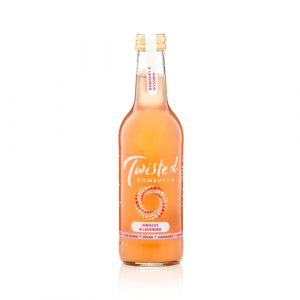
Are you tired of that uncomfortable, bloated feeling after a hearty meal? Bloating can put a damper on your day and leave you feeling sluggish and uncomfortable. Many people reach for antacids to ease this discomfort, but have you ever considered kombucha as a natural alternative? As a Food Scientist and Nutritionist, I’m here to unravel the mystery behind bloating and how both antacids and kombucha can come to your rescue. In this guide, we’ll explore the world of digestive discomfort and how kombucha is good for bloating compared to antacids.
Understanding Bloating
Before we dive into the battle of antacids vs. kombucha, let’s get a clear picture of what bloating is and why it happens. Bloating occurs when your stomach feels full and tight due to gas or air buildup in your digestive system. It can lead to discomfort, pain, and even affect your self-esteem. Common causes of bloating include overeating, gas-producing foods, swallowing air while eating or drinking, and gastrointestinal disorders like irritable bowel syndrome (IBS).
What causes bloating after eating?
Bloating after eating can be caused by several factors, including overeating, eating too quickly, consuming gas-producing foods (like beans or carbonated beverages), and underlying gastrointestinal conditions.
Antacids: The Traditional Approach
Antacids are a go-to remedy for many people when it comes to alleviating bloating and indigestion. These over-the-counter medications work by neutralizing stomach acid, which can provide quick relief from symptoms like heartburn and bloating. Antacids typically contain ingredients like calcium carbonate, aluminum hydroxide, magnesium hydroxide, or sodium bicarbonate, which react with stomach acid to form salts and water.
Kombucha: The Natural Alternative
Now, let’s introduce kombucha into the picture. Kombucha is a fermented drink created from tea, sugar, and a symbiotic culture of bacteria and yeast (SCOBY). While it’s primarily known for its probiotic content and potential health benefits, some kombucha enthusiasts have claimed that it helps with bloating as well. Furthermore, when it comes to the question, “Can kombucha truly alleviate bloating?” My answer is a resounding “Yes, it can.” Moving further into the blog, below, you will find the reasons as to why kombucha is good for bloating.
How Does Kombucha Help with Bloating?
- Probiotics: Kombucha is a source of probiotics, which are beneficial bacteria that can support a healthy gut. Having a balanced gut microbiome is essential for efficient digestion and can potentially reduce bloating caused by an imbalance in gut bacteria.
- Enzymes: Fermentation produces enzymes that may aid in the digestion of certain foods. Improved digestion can reduce the production of gas in the intestines, a common cause of bloating.
- Hydration: Proper hydration is key to preventing bloating. Kombucha is mostly water and can contribute to your daily fluid intake, helping maintain healthy digestion.
- Stress Reduction: Stress is a known trigger for digestive discomfort, including bloating. Kombucha’s potential calming effects might help reduce stress-related bloating for some individuals.
Bloating can have various underlying causes, so what works for one person may not work for another. As with any dietary change or supplement, it’s advisable to consult with a healthcare professional, especially if you have chronic or severe bloating.
Antacids vs. Kombucha: The Showdown
Now that we’ve examined the potential benefits of both antacids and kombucha for bloating let’s compare these two approaches head-to-head. Keep in mind that the effectiveness of each option may vary from person to person, depending on the root cause of their bloating and individual preferences. For some, antacids work fast and efficiently, while on the other hand, some people prefer the holistic approach of including kombuchas as it’s good for their bloating issues.
Antacids:
- Rapid Relief: Antacids typically provide quick relief from bloating and related symptoms.
- Widely Available: You can find antacids at most drugstores and supermarkets without much trouble.
- Convenience: They are convenient to carry and use when you’re on the go.
Kombucha:
- Natural Approach: Kombucha offers a natural and holistic approach to digestive discomfort, aligning with the growing trend toward natural remedies.
- Probiotic Benefits: The probiotics in kombucha may promote overall gut health, which can, in turn, reduce the occurrence of bloating.
- Long-Term Solution: While it might not offer immediate relief like antacids, incorporating kombucha into your diet could provide long-term benefits for digestive
health.
Conclusion
In essence, the choice between antacids and kombucha for bloating relief comes down to your personal preferences and the underlying causes of your bloating. It’s essential to listen to your body, stay hydrated, maintain a balanced diet, and seek medical advice when needed to ensure your digestive health stays on track. Whether you opt for the speedy relief of antacids or the holistic approach of kombucha, both can be valuable tools in your battle against bloat.
If you’re intrigued by how kombucha is good for bloating blues, we invite you to explore Twisted Kombucha’s range of probiotic-rich, healthy kombuchas. Our mission is to provide you with high-quality, delicious beverages that support your digestive health. Visit our website today to discover the goodness of Twisted Kombucha and take a step towards a happier, healthier you.
FAQs
Is it safe to take antacids regularly for bloating?
Antacids are generally safe for occasional use. However, if you find yourself needing them regularly for bloating or other digestive issues, it’s advisable to consult a healthcare professional to rule out underlying conditions.
Can kombucha replace antacids for bloating relief?
While kombucha offers potential digestive benefits, it may not provide the same rapid relief as antacids. Whether kombucha can replace antacids for your specific bloating needs depends on the cause and severity of your symptoms.
Can I drink kombucha while taking antacids?
There’s generally no known interaction between kombucha and antacids. However, if you have concerns or specific medical conditions, it’s a good idea to consult a healthcare provider.
Are there any side effects of long-term antacid use?
Long-term use of antacids can lead to certain side effects, such as calcium or magnesium imbalances. It’s crucial to follow the recommended dosages and consult a healthcare professional if you’re using antacids frequently.













